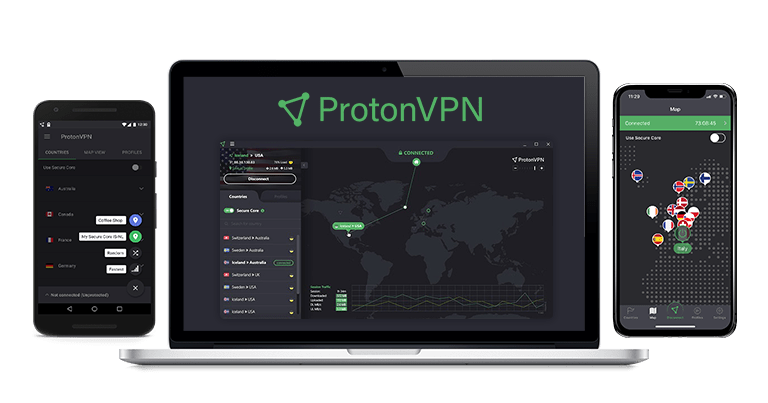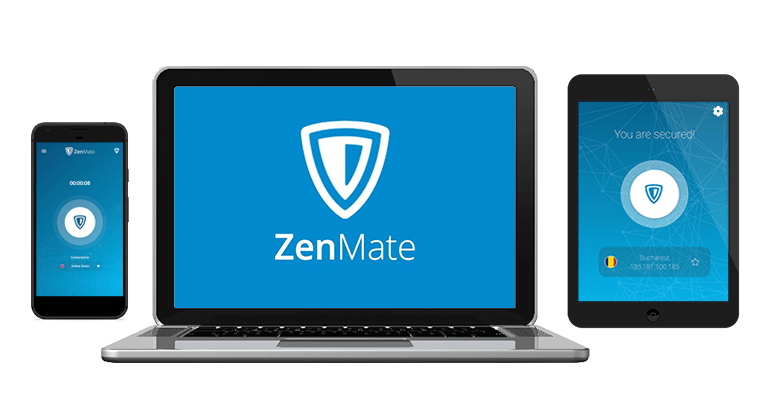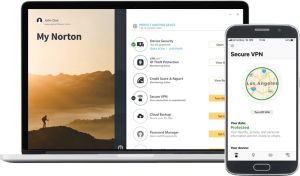The easiest and quickest way to get a Russian IP address is with a virtual private network (VPN).
A VPN replaces your current IP address with an IP address from a different location, making it seem like you’re actually browsing the web from inside that new location (in this case, Russia). A VPN is legal to use and very easy to set up.
I tested both popular and lesser-known VPNs, and I easily got a Russian IP with all 3 of my top VPNs.
3 Steps (Quick & Easy) for Getting a Russian IP Address in 2021
- Step 1: Get a VPN. Pick a good VPN provider that has at least 1 server in Russia (I recommend CyberGhost VPN).
- Step 2: Install the VPN. Download the app and follow the installation instructions. The process shouldn’t take more than a few minutes. If you use multiple devices, check how many simultaneous connections the VPN allows — ZenMate VPN is one of the few VPN providers that don’t limit the number of devices you can connect under a single account.
- Step 3: Connect to a Russian server. Find the VPN’s server location list and choose a Russian server. That’s it! Now you can enjoy the internet as if you were browsing in Russia.
Get a Russian IP Address with a VPN
When you connect to a VPN’s server in Russia, you will be given a Russian IP address and you can then browse the internet, stream video, and share files as if you’re actually in Russia.
A VPN hides your location by routing your online traffic through one of its encrypted servers to the websites you want to browse. All of your online activity is routed through the VPN’s IP address.
Your connection looks like this:
Your device → VPN server in Russia → Russian website
The Russian websites you visit will think you’re connected to a server from inside Russia because you’ll have a Russian IP address.
There are free VPNs available, but I don’t recommend that you use one. Free VPNs don’t include strong security features, have slow speeds, and usually keep user logs. They also limit your bandwidth and might not even work properly (they may not even replace your IP address).
But there are many premium VPNs that are inexpensive and that will safely and easily get you a Russian IP address.
How to Find the Best VPN
Every VPN that has a minimum of 1 Russian server can get you a Russian IP address. But some VPNs are better than others. Here are the metrics I used to rank my top 3 VPNs:
- Russian servers. Your VPN provider should have at least 1 server in Russia — otherwise, you won’t be able to get a Russian IP address. Many top providers actually don’t offer Russian servers. Also, a VPN that has more servers in Russia will usually provide you with faster speeds. For example, my top choice CyberGhost VPN has 24 Russian servers.
- Virtual servers. A virtual server will provide you with an IP address from the country that you want to connect to, but the physical server is located in another country. I normally avoid virtual servers because they take longer to communicate with a website (due to their distance from the country I want to access). But it might be necessary for a VPN to have virtual servers for Russia because Russia restricts internet access. All of CyberGhost’s servers in Russia are virtual servers.
- Connection speeds. VPNs will slow down your internet speed because of the encryption process and the extra distance your data has to travel between your device and the websites you visit. But good VPNs will minimize speed loss by having multiple servers to prevent overcrowding.
- Good security. To keep your data safe, the best VPNs use 256-bit AES encryption — one of the best encryption types available that is also used by banks and governments around the world. VPN providers should also offer multiple VPN protocols, including OpenVPN, WireGuard, and IKEv2. And a good VPN should also have a kill switch, which shuts off your internet access if your VPN connection drops — preventing your data from accidentally getting leaked.
- No-logs policy. VPN providers should never store logs of your activity. A no-logs policy means the VPN provider doesn’t keep records of the files you download and the websites you visit.
- Simultaneous connections. Most VPNs set a limit on the number of devices you can connect at the same time. The average is 5-7 devices (CyberGhost VPN allows 7 connections, but ZenMate provides an unlimited number of VPN connections).
- Customer support. Good VPNs should offer assistance 24/7 over live chat and email. They also have extensive knowledge bases that help you troubleshoot your problems by yourself.
- Pricing & refunds. VPNs are cheaper if you get long-term subscriptions (1-, 2- and 3-year plans). The best services have money-back guarantees and free trials. Most VPNs accept credit cards and PayPal — but the best also include cryptocurrency as an option.
The Best 3 VPNs for Getting a Russian IP Address
1. CyberGhost VPN — Best VPN for Getting a Russian IP Address
CyberGhost VPN has 24 virtual servers in Saint Petersburg. With so many servers available, you shouldn’t have a problem finding a server under 100% load (full capacity) and getting fast streaming speeds. And all of the Russian servers support peer-to-peer (P2P) traffic, so you can download torrents with pretty high speeds, too (it took me about 10 minutes to download a 4 GB movie).
CyberGhost allows 7 VPN connections at once, and its apps are available on all platforms, including Windows, macOS, iOS, Android, Linux, and even smart TVs. CyberGhost VPN has a user-friendly design, so you should have an easy time navigating the app even if you’ve never used a VPN before.
CyberGhost VPN also offers:
- 256-bit AES encryption.
- Kill switch.
- No-logs policy.
- Ad blocker.
CyberGhost VPN’s customer support representatives are available 24/7 through live chat, and they’re very responsive and knowledgeable. I received a reply to my question from the support team via live chat within minutes. CyberGhost also has an extensive FAQ section where you can find many useful tutorials.
CyberGhost VPN has several plans to choose from. The monthly plan is the most expensive one, and it comes with a 14-day money-back guarantee. But the 1-year, 2-year, or 3-year plans are all affordable (the 3-year plan also includes 3 months free), and they’re all backed by a risk-free 30-day money-back guarantee.
2. ProtonVPN — Best VPN for Fast Speeds (with Physical Servers in Russia)
ProtonVPN has 16 servers in Russia — and all of them are physically located in Saint Petersburg. And because ProtonVPN has physical servers in Russia, you can maintain better speeds as you’re browsing the web, streaming video, or sharing files.
ProtonVPN is also very secure. All of ProtonVPN’s apps are open-source, meaning anyone can inspect the apps to make sure that they’re safe. Leading cybersecurity company SEC Consult independently audited ProtonVPN in 2019, and it found only a couple of minor vulnerabilities that ProtonVPN immediately fixed.
ProtonVPN uses proprietary Secure Core architecture that routes traffic through multiple ProtonVPN servers located in Switzerland, Iceland, and Sweden before the traffic exits ProtonVPN’s network. So, even if the Russian government were to compromise the Russian servers, they wouldn’t be able to see your real IP address (they would only be able to see the IP address of a Secure Core server).
ProtonVPN also has:
- 256-bit AES encryption.
- No-logs policy.
- Kill switch.
- Ad blocker.
Unlike CyberGhost VPN, ProtonVPN doesn’t offer 24/7 live chat support — just email support (and it took me 1-2 days to get an answer). ProtonVPN’s FAQ section has helpful articles, but it’s also not as extensive as CyberGhost’s knowledge base,
ProtonVPN has a free plan that only gives you access to 3 servers (in the US, Japan, and the Netherlands) and it covers just 1 device. ProtonVPN Basic includes servers in 54 countries, 2 VPN connections, P2P support, and an ad blocker. ProtonVPN Plus adds Secure Core servers, TOR over VPN, streaming support, and up to 5 VPN connections. ProtonVPN Visionary adds a ProtonMail account as well as up to 10 simultaneous VPN connections. ProtonVPN offers a prorated 30-day money-back guarantee on all of its paid plans.
3. ZenMate VPN — Best VPN for Multiple Devices
ZenMate VPN has 12 Russian servers — and all of them are virtual servers that also support P2P traffic.
ZenMate VPN and CyberGhost VPN are owned by the same company (Kape Technologies), so ZenMate’s app design is very similar to CyberGhost’s interface. Like CyberGhost VPN, ZenMate VPN is also very easy to use (even for first-time users).
ZenMate doesn’t include as many features as CyberGhost or ProtonVPN, but it allows unlimited simultaneous connections — making it a good option for large households with multiple users.
ZenMate VPN also has all of the standard VPN security features, including 256-bit AES encryption, a no-logs policy, and a kill switch. But ZenMate’s privacy policy hasn’t been independently audited, and the VPN is headquartered in Berlin, Germany, which is a part of the 14 Eyes Alliance.
ZenMate VPN’s Ultimate plan is available for 1 month, 1 year, or 3 years, and it comes with a 30-day money-back guarantee.
Best VPNs for Getting a Russian IP Address (2021) — Final Score:
Source of Article






